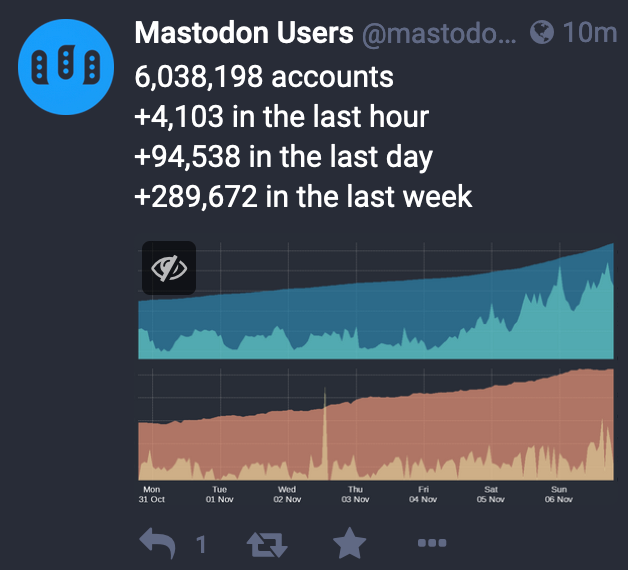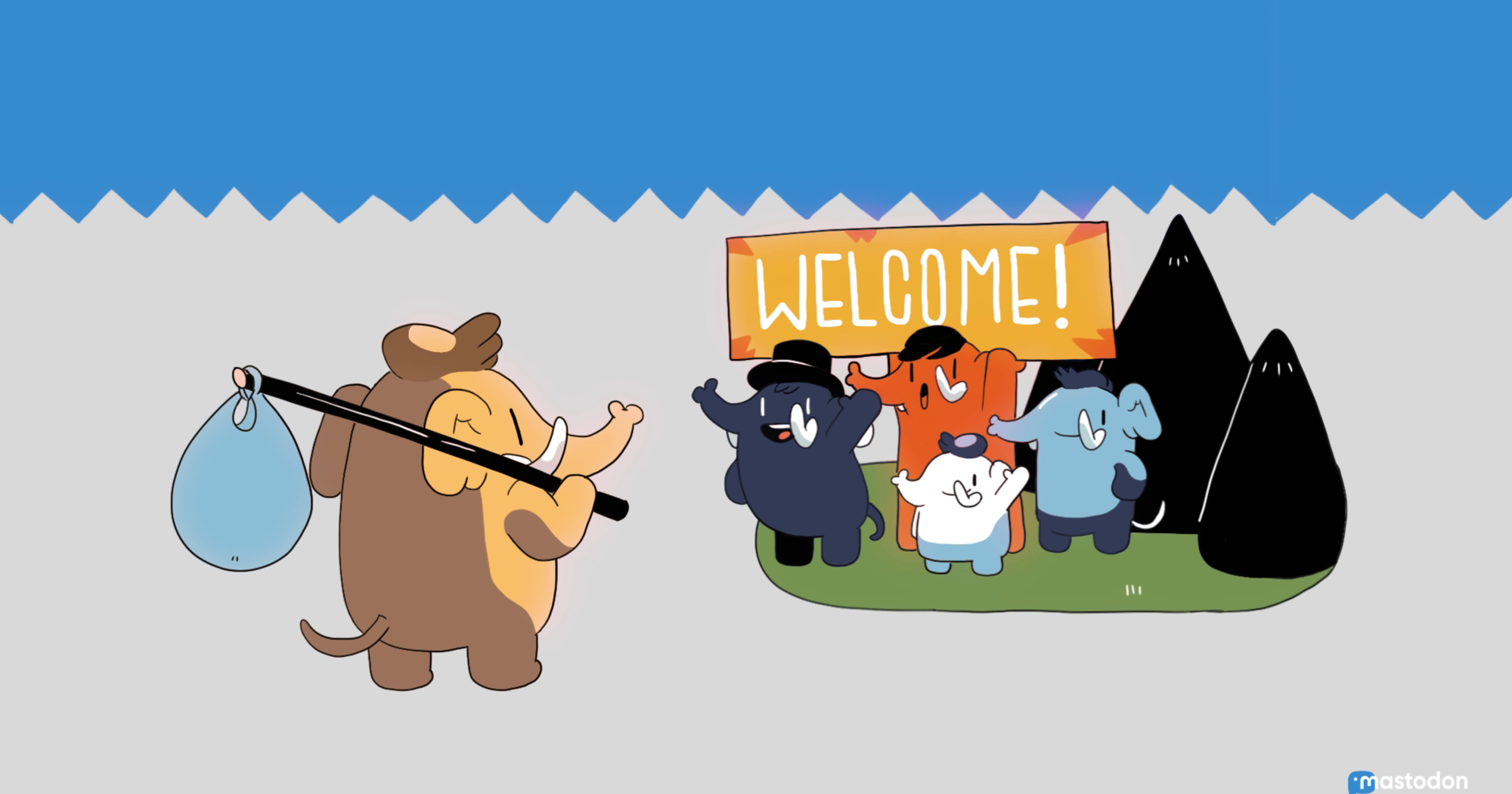The Twitter Migration is Real and Viable Thanks to Mastodon
Mastodon is a return to organic, pre-algorithm social media that many Twitter power users are finding refreshing but it will be tested by an unprecedented influx of new users.

When I laid out my interim social media strategy in a tweet last week Mastodon was included as an afterthought. Setting up an account and enabling cross-posting to both it and Twitter was easy enough so I figured "why not?" Like a lot of folks who pay attention to emerging tech I had a years-old and completely neglected Mastodon account and was generally aware of the platform. However, I didn't think it was mature or user-friendly enough to be a real contender in the Twitter replacement race. I was mostly wrong.
Over the next couple of days I'd dig a little deeper, read up on the progress of the underlying federated architecture, follow some new people, try out some of the many apps, and generally get familiar with the advancements made over the past several years. Four days later, pretty-much convinced, I stood up my own Mastodon instance (server) at https://social.blogsofwar.com using the inexpensive and drop-dead simple hosting services at Masto.host. I went full toot (that's what they call a post).
Turns out I'm not alone. The migration is very real:

And it's throwing up some mind-boggling numbers too:

It isn't all good news however. This is an unexpected and unprecedented surge for the Mastodon ecosystem. That means that popular servers are struggling with load, some user experiences are less than ideal, there are glitches (such as delayed feeds or media not posting), and there are culture clashes with old and new users - although I haven't seen any result in conflict. The existing Mastodon users have been overwhelmingly patient, welcoming, and helpful.
You can mitigate some of these issues by standing up your own server, signing up with a smaller one, or by just being patient and secure in the knowledge that it will get sorted pretty quickly. Hundreds of new servers are coming online and admins are upgrading existing instances to meet the demand. Keep in mind that most of the servers are run by volunteers who pay out of their pockets, and donate their time, to provide you a service. Most of them have a tip jar. Please use it and be please be patient with them.
What sold me?
- Control: I can have complete control of my content and experience. My experience can't be shaped algorithmically or managed by a corporation (or fascist-aligned jerk). This is a move back to completely organic feeds and interactions. How much control you have can vary - from running your own server from home, to using a dedicated Mastodon hosting service like Masto.host or cloud hosting provider, to signing up for one of the many community servers that are run by volunteers and aligned with your interests and your beliefs about a community should be run. Control extends deeply into the content level as well where you can block words, accounts, hashtags, and even entire domains - which is great because Nazis and trolls like to cluster.
- Thoughtful Friction: I know you probably have no idea what that means but I'm referring to the design choices that were consciously made to minimize the kind of piling on, swarming, rage of the day toxic engagement that drove so much activity on Twitter. Quote tweets are a good example:I used quote tweets to highlight informative or positive things on my Twitter account so initially this feature was missed but I understand and appreciate the design choice. With reflection, I've come to realize that even some of the perceived benefits of Twitter led to a lot of mindless and toxic behaviors that are best left behind. Not everyone agrees, of course.
- Decentralization: I'm not one of those "decentralize everything!" guys. In fact, I think a lot of the proposals in that space are either unrealistic or will create more problems than they'll solve. However, I think the case for social media decentralization, specifically the Fediverse, might be stronger and more realistically achievable. Will there be unintended consequences and glitches? Sure. But there's potential here worth deeply exploring, especially in light of the fact that the current models are so exploitative and damaging to individuals and society at large. All of these factors have, so far, led to an experience that feels more like the BBS/Usenet/FidoNet days of old with a shiny new TweetDeck style interface on top. If you remember those days you'll recognize that as a compliment and not a jab. There's more real engagement and more potential for crafting the experience that you want, not one that's been scientifically engineered to leverage your lizard-brain in a hostile takeover. It's still the internet and everything could still go disastrously off the rails but going back to Twitter, or staying there, likely just won't be an option for several million people.
- Moderation: Mastodon includes very strong moderation features. Server admins also have the right to establish their own terms of service and make their own moderation decisions. That means that they don't need a complex corporate policy framework to ban an antisemitic troll or other disruptive accounts. Yes, that could be abused, but members of that server can migrate elsewhere if they object. This flexibility for both admins and users will allow each to find and build the server that aligns with their preferences in this space.
Words of Caution
These are early impressions and while I am optimistic remember that we are entering new territory. Some of this is already a bit messy and it will get messier. It's not clear what this kind of influx of new users and attention will ultimately do to Mastodon and the Fediverse. It feels like utopia (for many users) now but there have been growing pains before the #TwitterMigration and there will be many more as it continues to accelerate.
Please keep in mind that this level of attention will drive new levels of malicious activity. Hostile states and dangerous orgs will probe for vulnerabilities. They will develop new attacks and information operations shaped for this new environment. Trolls will see a large pool of new users as vulnerable fish in a barrel and will do everything they can to destroy their experience. I think Mastodon has the tools to manage what’s coming but we still have to be responsible and cautious as individual users. Enable 2FA, review new accounts before you follow them, block liberally, report bad experiences to your Mastodon server admins and mods, and don’t give trolls the satisfaction of engagement.
Up Next
I'll cover some tips for getting started in an upcoming post. Hit the subscribe button at the top of the site if you want to get that delivered to your inbox as soon as I publish it.
If you’re already playing around with Mastodon, or expect to soon, proceed with an open mind, some healthy caution, and fair amount of patience. It’s not Twitter and that’s a good thing.
You can find me there at @john@social.blogsofwar.com.
Update
Tips for getting started - as promised:



